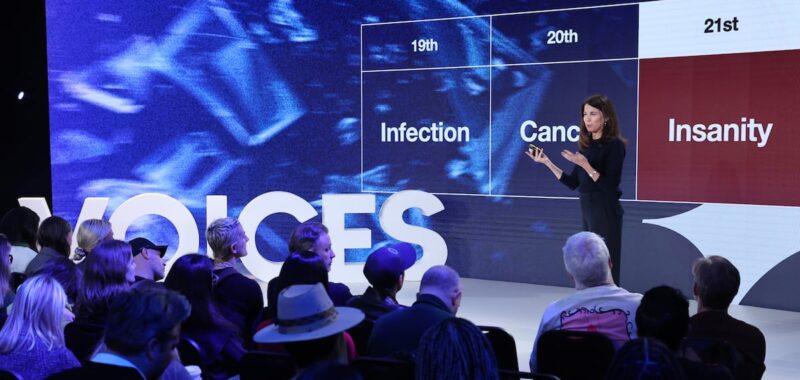Just a decade ago, retailers saw the endless aisle of e-commerce as an untapped goldmine. While stores could only stock so much product, online the possibility was infinite.
But limitless options have become a burden as much as a blessing to shoppers, causing choice paralysis and leading to high cart abandonment for retailers, according to Julie Bornstein, a former executive at Nordstrom, Sephora and Stitch Fix.
âThe problem is information overload,â Bornstein said at BoF VOICES 2024. âThe amount of input that human brands are getting every second of everyday is something the human species has never experienced â too many pages, too many products.â
Her solution, demonstrated on stage for the first time publicly Wednesday, is Daydream, an AI-powered shopping platform. Like ChatGPT or Microsoftâs Copilot, Daydream allows users to ask questions via text prompts like âwhat can I wear to a âvintage 1920sâ-themed party?â and receive a feed of recommended products, with images and prices, that they can then refine further. Customers can also use images to search.
The platform allows shoppers to save items they like and builds a customer profile based on their browsing activity it calls a âStyle Passport.â The more time a user spends on the platform, the more customised Daydreamâs results.
Bornstein and her co-founders, who include Matt Fisher, Dan Cary, Lisa Green and Richard Kim, are racing to create the first big consumer-facing shopping platform built on using generative AI to solve the problem of search and discovery in e-commerce. Many fashion-related AI start-ups have focused on backend business use cases such as design.
Bornstein believes Daydream can prove more effective than the standard AI chatbots that have emerged, and has investors who are betting on it. In June Daydream announced $50 million in seed funding. The round was led by Forerunner Ventures and Index Ventures. Googleâs venture arm, GV, as well as True Ventures, were also investors.
âAt Daydream, the way weâre thinking about solving this problem is creating whatâs in essence ChatGPT for shopping,â Bornstein said. âIf you have the ability to ask anything you want, we have the ability to help you.â
Half of surveyed fashion executives see consumer product discovery as the key use for generative AI in 2025, according to BoFâs State of Fashion 2025 report. Zalando, for instance, saw a 18 percent year-on-year lift in profitability this year after launching multiple generative AI functions such as a ChatGPT-powered shopping assistant that helped lower costs and grow customer engagement.
Daydream isnât Bornsteinâs first go at fashion discovery tech. In 2018, she launched shopping app The Yes, which used AI to create a personalised product feed for users. Pinterest acquired the platform in 2022, getting Bornsteinâs expertise and her companyâs personalisation technology, though it eventually shuttered the app itself.
Daydream, which will charge a commission on sales, is her next big swing. Itâs already working with 2,000 brands, including Gucci, H&M, Net-a-Porter and Alo Yoga.
âMy career journey has been a mirror to tech development over the last 20 years,â Bornstein said. âOur goal is to build a personal stylist for everyone, but in the meantime weâre focused on conversational search.â


